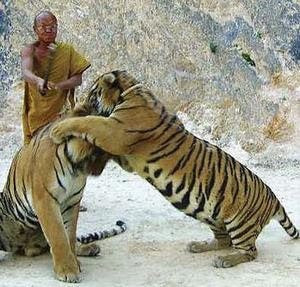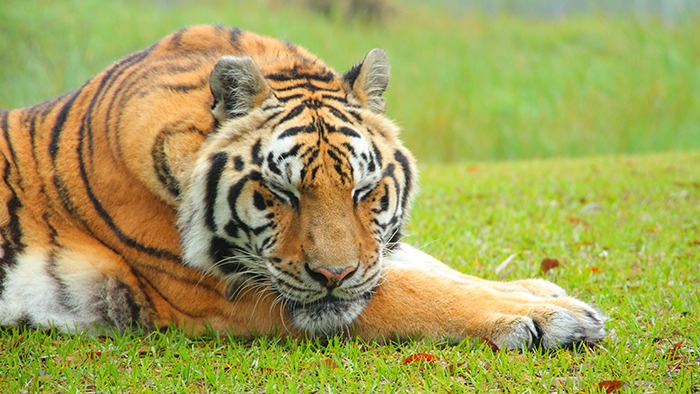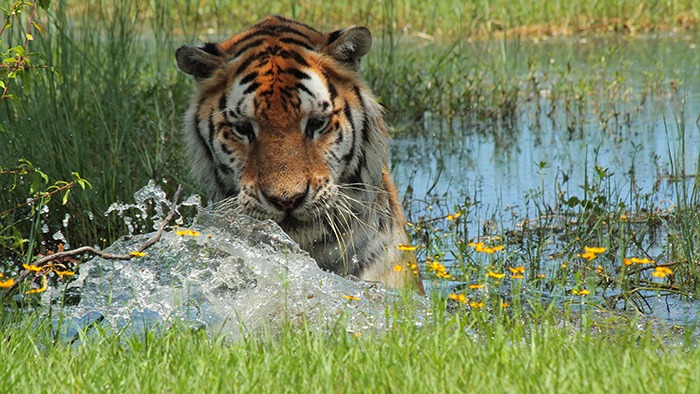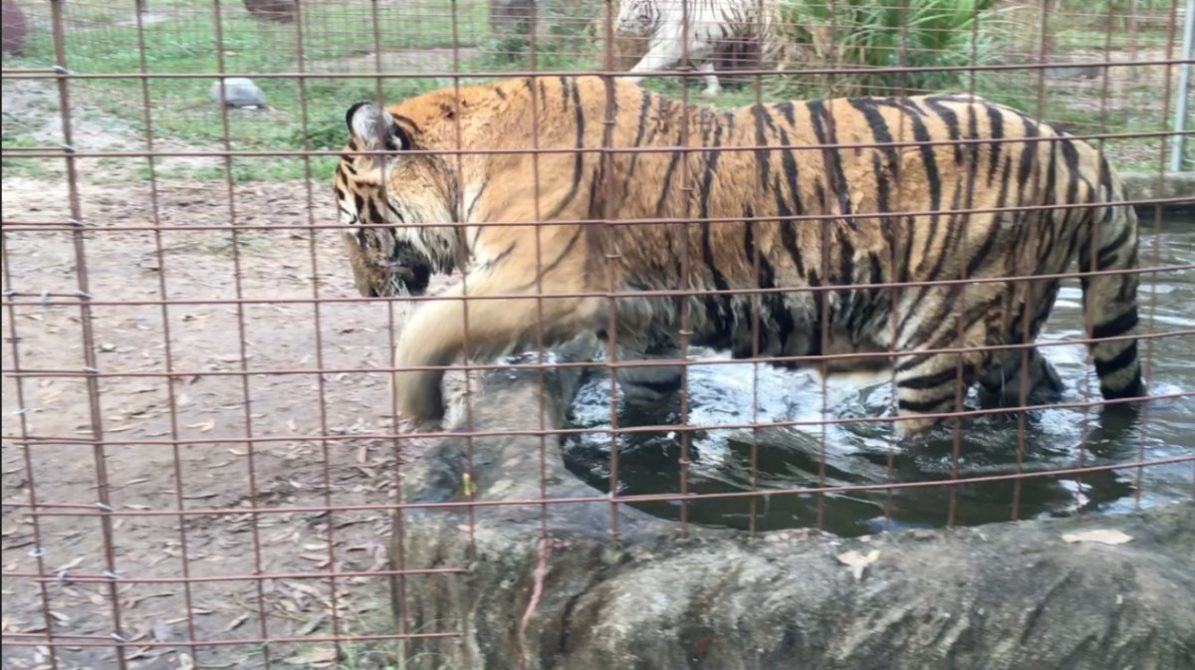Interaction with Big Cats Leads to Illegal Trafficking
Interaction with Big Cats Leads to Illegal Trafficking
Thailand’s Tiger Temple was founded in 1994 as a forest temple and sanctuary for wild animals. The temple rescued it’s first tiger in 1999, an orphaned cub that had been found in a local village. The cub died soon after its arrival. According to reports 8 cubs in need of rescue were brought to the temple a few years later. By January 2016 the temple housed more than 150 tigers.
Somewhere along the way the temple evolved from a rescue center to a breeding facility focused on profiting from the exploitation of their collection by charging tourists for photo ops.
 The temple’s operations violated the Convention on International Trade in Endangered Species (CITES) international treaty on wildlife to which Thailand is a signatory, which bans commercial breeding of protected wild animals such as tigers for their parts or derivatives. In addition the temple did not possess a license required for breeding as determined by the Thai Wild Animals Reservation and Protection Act of 1992. Yet for years the temple continued to breed tigers for profit.
The temple’s operations violated the Convention on International Trade in Endangered Species (CITES) international treaty on wildlife to which Thailand is a signatory, which bans commercial breeding of protected wild animals such as tigers for their parts or derivatives. In addition the temple did not possess a license required for breeding as determined by the Thai Wild Animals Reservation and Protection Act of 1992. Yet for years the temple continued to breed tigers for profit.
On the surface it appeared as the though the temple was solely profiting from tourists paying entrance fees to walk among the tigers and take selfies with the big cats. This practice in and of itself that results in tigers being bred for an unnatural life in captivity with no benefit to conserving the species in the wild. However, something much darker was taking place behind closed doors.
Following years of prodding from a coalition of international animal welfare organizations authorities in Thailand launched a crackdown on the Tiger Temple in June of this year. The ITC is comprised of 45 NGO’s (non-governmental organizations), including Big Cat Rescue, focused on ending the exploitation of captive big cats which has a direct impact on their wild counterparts.
Along with 137 live tigers, authorities seized the bodies of 40 tiger cubs in a freezer, 30 cubs preserved in jars and approximately 1,000 amulets made from tiger skin. These preserved cubs and trinkets were on their way to fuel the black market trade of this protected species.
Thailand’s Tiger Temple is just one of hundreds of similar interaction/farming operations. According to the Environmental Investigation Agency (EIA), there are more than 200 such centers across Asia ranging in size from tiny to huge. These centers, spread across China, Laos, Vietnam and Thailand, jointly house between 7,000-8,000 captive tigers. That’s thousands more than the estimated 3,900 tigers left in the wild, which occupy only about 7% of their historic range.
In addition the U.S. is reported to have more than 5,000 tigers living in captivity across the country. Many of these tigers will most likely end up being sold illegally to feed the demand for tiger parts, furs, and products.
The wild tiger population has declined more than 95% over the last 100 years. 2016 has also marked a significant upsurge in tiger poaching and trade. In India more tigers have been killed in the first five months of 2016 than in the whole year of 2015.

What is being done abroad?
Following the dramatic findings at Thailand’s Tiger Temple animal welfare groups across the globe are urging governments throughout Asia to put an end to tiger farming. The ITC continues to urge countries with tiger farms to end the breeding of tigers for commercial purposes and phase out existing tiger farms.
The dwindling population of wild tigers is threatened by the trade for nearly all of their body parts – from skin and bones, to teeth and claws. These products including tiger skin rugs and tiger bone wine are considered luxury items that elevates one status. Trade in captive tiger parts and products stimulates demand for tiger products, be it from wild or captive tigers, and undermines enforcement efforts by making it difficult to know whether seized tiger products come from wild or captive tigers.
In September Big Cat Rescue will join several other animal welfare leaders at the 17th meeting of the Conference of the Parties to CITES in Johannesburg, South Africa. During the 12-day conference the coalition will attend meetings regarding the protection and conservation of several cat species including tigers as well as lobby attendees to support a ban on tiger farming.
In an effort to educate and solicit as many attendees as possible the coalition will man an information booth throughout the event. Additionally the coalition will be hosting a social gathering where presenters will speak in support of phasing out tiger farms.

What is being done here in the U.S.?
In April, the U.S. Fish and Wildlife Service (USFWS) tightened regulations in the trade of tigers, requiring all facilities that want to transfer tigers across state lines be registered, making it easier to detect illegal wildlife trafficking.
USFWS also rescinded the generic tiger loophole. The loophole allowed private owners to breed tigers whose lineage could not be traced back to the wild with no regulation while accredited facilities participating in the Species Survival Plan were heavily regulated and required permitting prior to breeding pure bred tigers in an effort to conserve the species.
Big Cat Rescue has been pressuring the USFWS since 2007 to rescind this loophole and in August of 2011 the generic tiger issue was published to the Federal Register for public comment and received over 15,000 comments in support of our request to ban the breeding of non purebred tigers. Still more needs to be done, including banning public contact with tigers for photo ops.
Back in 2012, a coalition of animal advocacy and conservation organizations including Big Cat Rescue, The Humane Society of the United States, World Wildlife Fund, Detroit Zoological Society, International Fund for Animal Welfare, Born Free USA, Fund for Animals and Global Federation of Animal Sanctuaries petitioned the USDA to amend the Animal Welfare Act.
The change in rules would prohibit the public from coming into direct contact with dangerous animals, including big cats, bears and non-human primates, regardless of their age, as well as request that young animals aren’t separated from their mothers before a species-appropriate age.
Finally the USDA has taken a small but positive step forward with the prohibition of the public handling of big cat cubs including tigers, lions, jaguars, leopards, and cheetahs under the age of four weeks.

How Can You Help?
You can help end the exploitation of captive big cats and the abuse they endure as well as ensure the survival of these incredible species in the wild by taking action at BigCatAct.com
Jamie Veronica
President of Big Cat Rescue
A permanent sanctuary for big cats &
rehabilitation center for native FL bobcats




